The world of music production can be an exhilarating place to find yourself.
Every day presents a new opportunity to create, innovate, and add your own unique flavor to the sounds that define our lives.
However, finding your specific niche in this vast field can be somewhat challenging.
Fear not, because in this guide, we’re going to help you find your perfect place in the music production field!
In today’s article, we’ll be covering:
- The journey to becoming a music producer ✓
- Music production careers in the music industry ✓
- Key roles within a recording studio ✓
- The exciting path to becoming a radio broadcast engineer ✓
- Exploring the world of digital audio editing & sound editors ✓
- Delving into live sound engineering ✓
- Video game & multimedia production opportunities ✓
- Additional music production careers ✓
By the end of this article, you’ll have a better understanding of these various music production careers and how you can start working towards them.
With a little bit of dedication, practice, and the right guidance, you’ll have all the tools necessary to build a thriving career as a music producer.
So, let’s dive in…
Table of Contents
- Becoming a Music Producer: The Process & Its Importance
- Careers in Recording Studios: From Sound Mixer to Studio Manager
- Radio & Sound: The Path to Becoming a Radio Broadcast Engineer
- The Digital Audio Editor & Sound Editors: Mastering the Art of Audio
- Video Game & Multimedia: The Role of a Sound Designer & Audio Director
- Bonus Section: 4 Additional Music Production Jobs
- Music Production Careers: Final Thoughts
Becoming a Music Producer: The Process & Its Importance
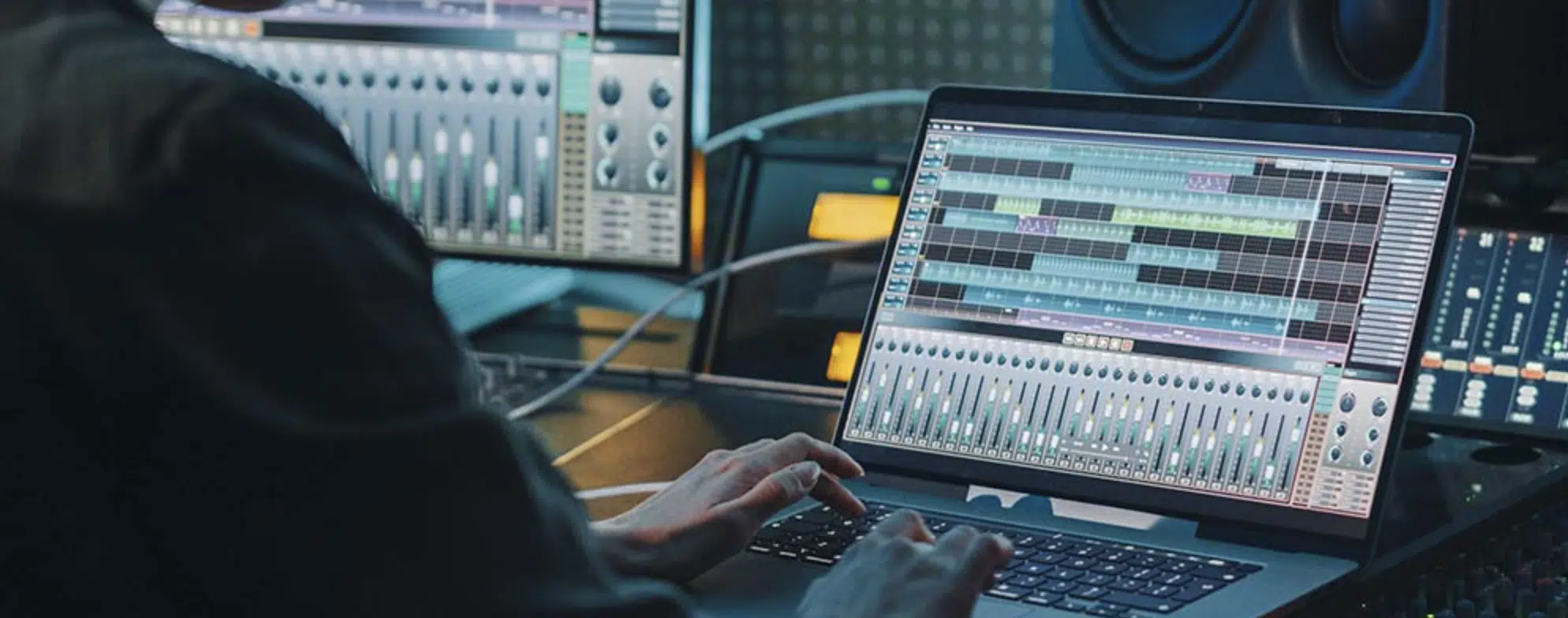
Earning a music production degree can give you a head start in this competitive field.
A degree not only provides you with technical skills but also enhances your understanding of music theory, composition, and performance.
On top of that, the connections you make in music school can open doors for your future music production careers.
As a music producer, you’ll find that continuous learning is vital.
You have to stay updated with the latest:
- Sound equipment
- Recording software
- Production techniques
- Music trends
A music education equips you to adapt and evolve 一 keeping your beats fresh and your skills sharp.
However, remember that a degree is not everything…
I’ve seen some of the best music producers rise from humble beginnings, their raw talent and relentless drive carrying them to the top.
So, whether you’re a music production degree holder or a self-taught artist, it’s your passion and dedication that will define your success.
-
Careers in Music Production: What to Expect?
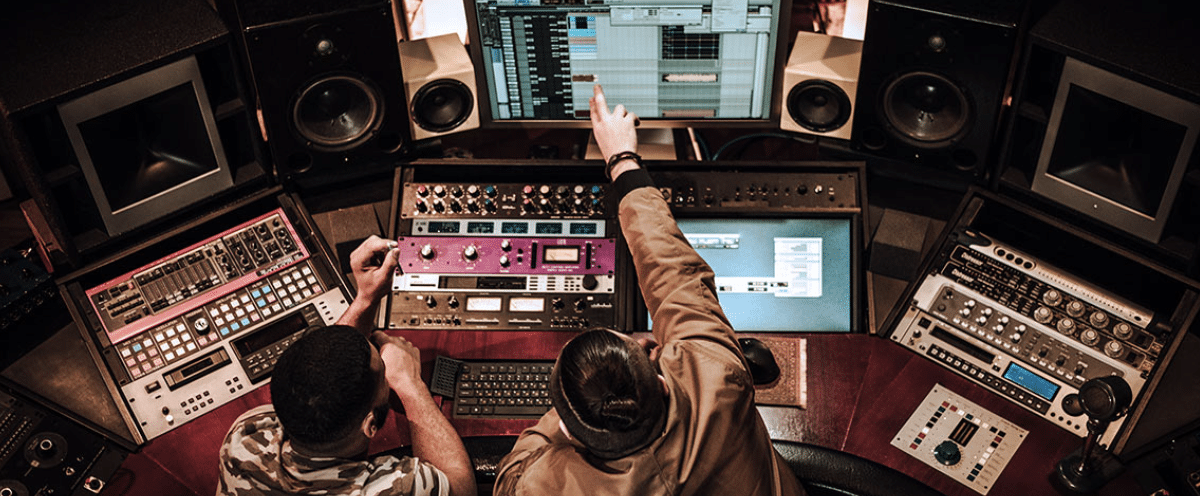
As a music producer, your work revolves around creating and shaping a song or an entire album.
You’ll be working with recording artists 一 helping them craft their sound to bring their musical vision and beats to life.
In the recording studio, a music producer acts as the project’s heartbeat, overseeing everything from the initial recording sessions to the final mix.
You’ll be involved in every step of:
- The recording process/working with a recording artist
- Coordinating with musicians
- Working with other engineers
- Editing audio recordings
- Etc.
Being a music producer also means being a creative leader.
You’ll guide the artist through the recording process, making key decisions about the arrangement, instrumentation, and sound quality.
You might even help with songwriting, arrange recording sessions, and select the perfect take from multiple performances.
It’s a demanding role, but seeing an idea evolve into a finished piece of recorded music is genuinely rewarding.
-
The Role of Music Producers in the Music Industry
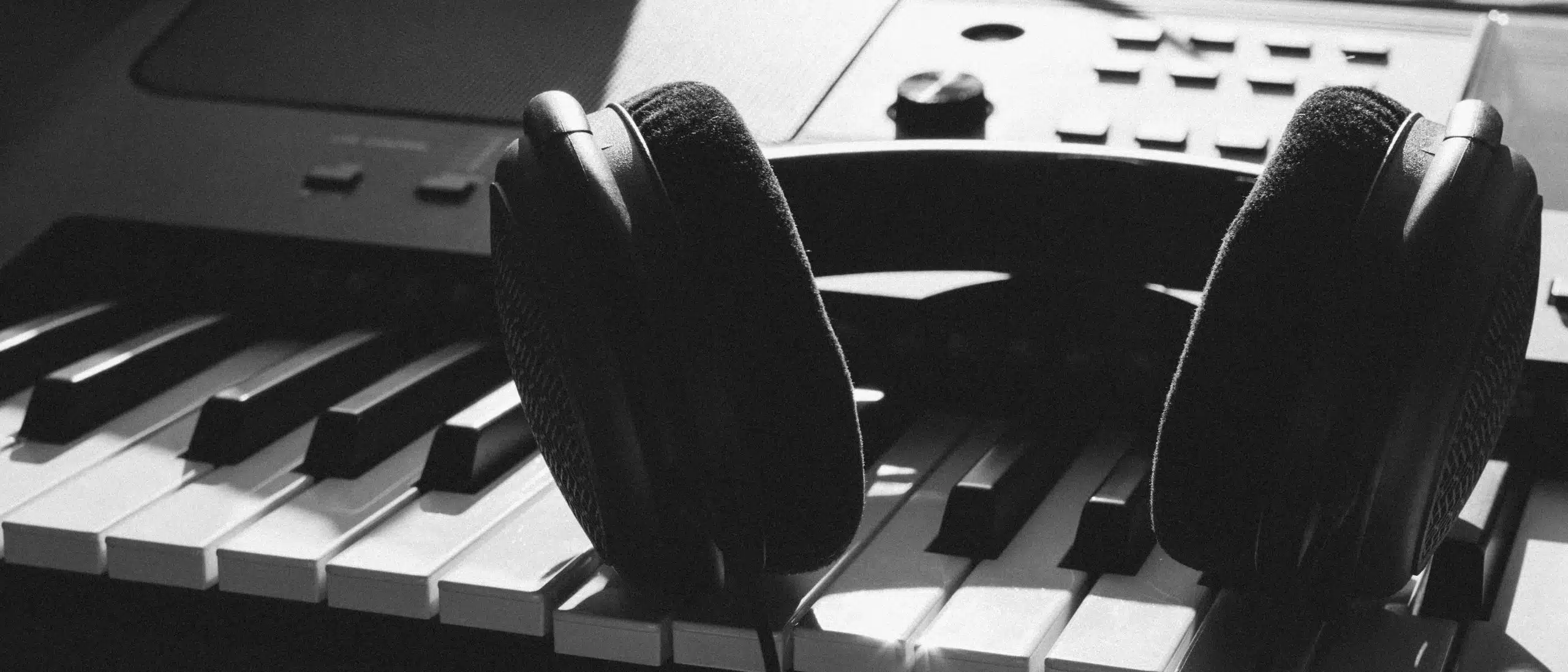
Music producers hold a significant place in the music industry.
They are the link between the artist’s music and the audience; shaping the sound to suit market trends and listener preferences.
As a music producer, your role extends beyond the technical aspects of recording, editing, or enhancing a music performance.
You need:
- A deep understanding of the music industry’s dynamics
- A keen ear for what sells
- An innate ability to anticipate the next big thing
Remember, in the end, the music producers work is about more than the ability to create music.
It’s about creating an experience, a mood, a moment in time, which makes it such an exciting career path.
Careers in Recording Studios: From Sound Mixer to Studio Manager
Stepping into a recording studio opens up a world of possibilities.
The studio is where raw talent meets technology, and the magic of music comes to life.
-
The Role of a Production Sound Mixer in Recording Sessions
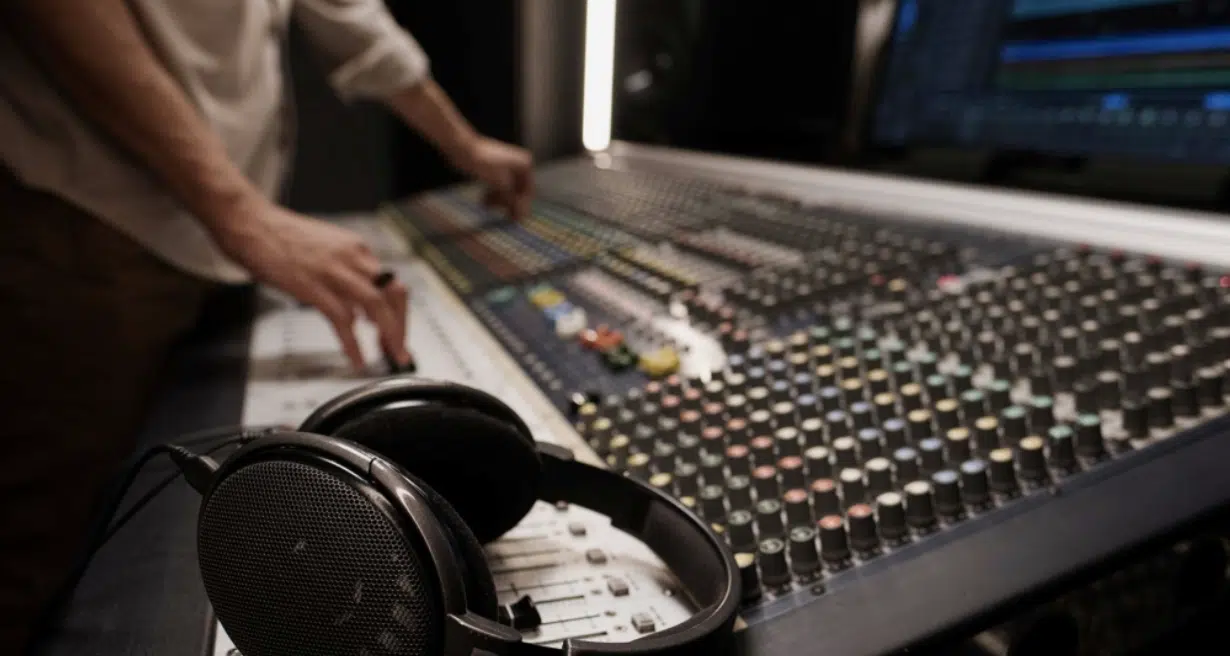
Working as a production sound mixer in a recording studio is an exciting music production career.
Your job here is to balance the different audio elements of a track to achieve the desired sound.
You’ll have to:
- Control volume levels
- Tweak sound effects
- Adjust the panning of tracks to create a soundscape that complements the recording artist’s vision
As a sound mixer, you also play a significant role in the post-production process.
This involves mastering 一 where you ensure that the final mix is ready for distribution.
You’ll work with sophisticated sound equipment and manipulate the audio to make sure the mix sounds great on any playback device.
Try mixing different styles of music, and over time, you’ll develop an ear for what works and what doesn’t.
And remember, there are no set rules in mixing…
Your creative instinct as a musical artist or music producer plays a vital role here.
-
Becoming a Recording Studio Manager
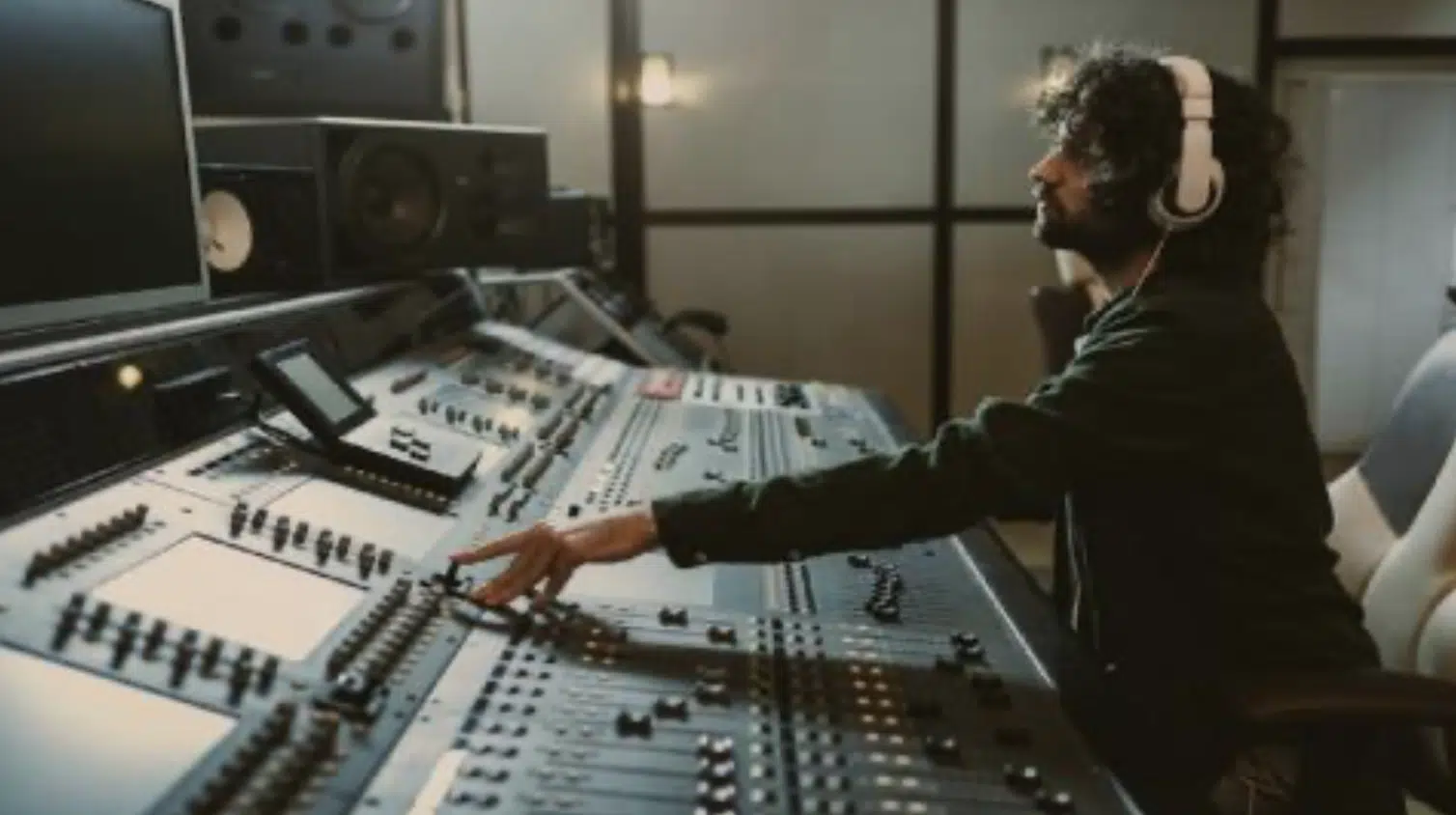
Managing a recording studio is a career path that merges business acumen with a love for music.
As a recording studio manager, you’ll:
- Oversee the day-to-day operations of the studio
- Ensure the smooth running of recording sessions
- Manage the studio’s recording equipment
In addition to these responsibilities, you’ll also liaise with artists and their management teams, coordinate schedules, and handle budgeting.
You’re essentially the backbone of the recording studio, ensuring everything runs like a well-oiled machine.
Let me tell you from my experience, being a recording studio manager isn’t all about administrative work.
You’ll be right in the heart of the music production process, working alongside artists, music producers, and sound engineers (or, studio engineers).
It’s a role that keeps you at the center of the action and makes every day an exciting adventure.
Radio & Sound: The Path to Becoming a Radio Broadcast Engineer
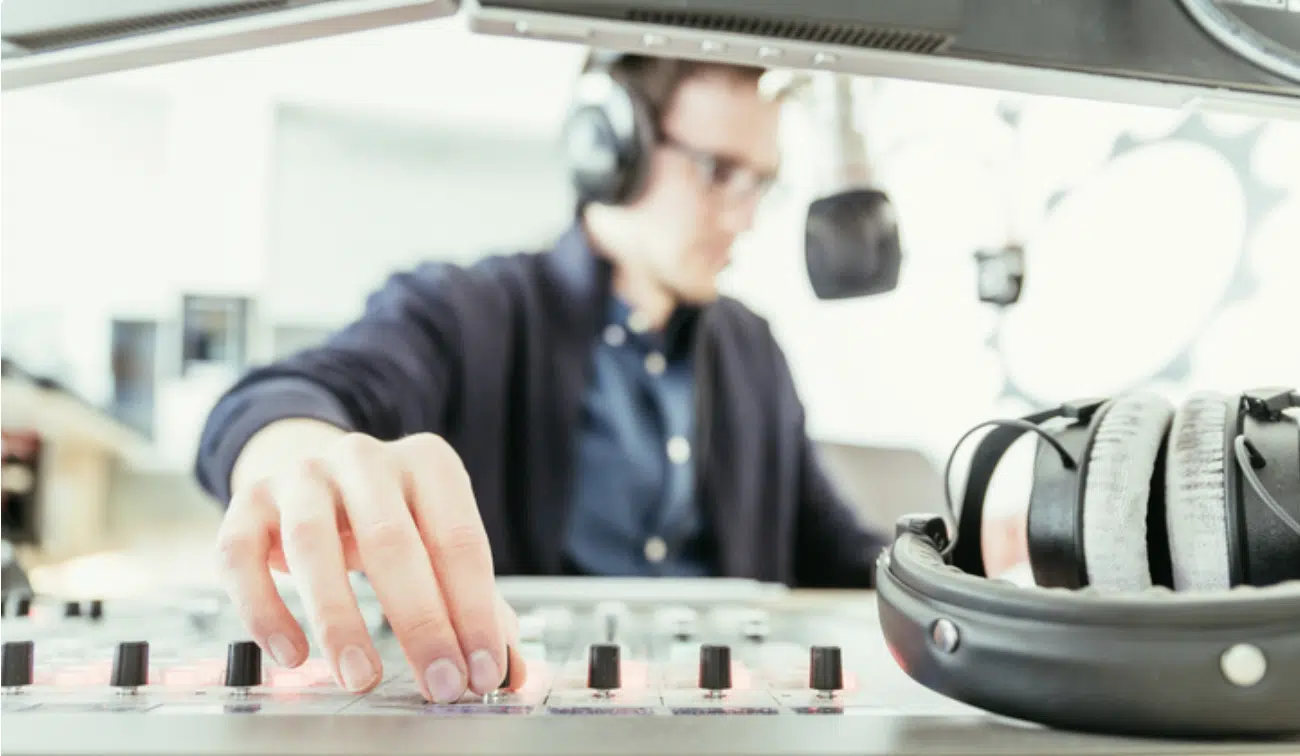
Many radio stations rely heavily on sound quality.
Listeners tune in to radio stations for an engaging audio experience, and it’s the job of a radio broadcast engineer to ensure that.
You’ll be responsible for the technical aspects of broadcasting 一 from maintaining the transmitting equipment to managing the audio quality during live broadcasts.
Understanding radio station operations is crucial for a broadcast engineer.
This includes knowledge of broadcast laws and regulations, understanding how radio signals work, and managing/maintaining sound equipment.
Sound quality can make or break a radio station’s reputation, therefore, your role as a radio broadcast engineer is vitally important.
Radio broadcast engineers have a significant role in handling audio recordings.
From pre-recorded shows to live broadcasts, your job is to ensure the audio sounds perfect for the listeners.
During a live broadcast, you’ll be responsible for:
- Handling the mixing desk
- Controlling audio levels
- Coordinating with the show’s presenters and producers
It’s a dynamic job that requires quick thinking and sharp technical skills.
Pre-recorded shows, on the other hand, allow way more time for perfecting the audio.
You can tweak the sound, edit out mistakes, and add audio effects to enhance the show’s quality.
Ultimately, whether it’s live or pre-recorded, your work as a radio broadcast engineer has a direct impact on the listener’s experience.
The Digital Audio Editor & Sound Editors: Mastering the Art of Audio
The digital world has revolutionized the music industry, and with it, the roles of digital audio editors and sound editors have evolved.
-
The Role of a Music Editor in the Studio
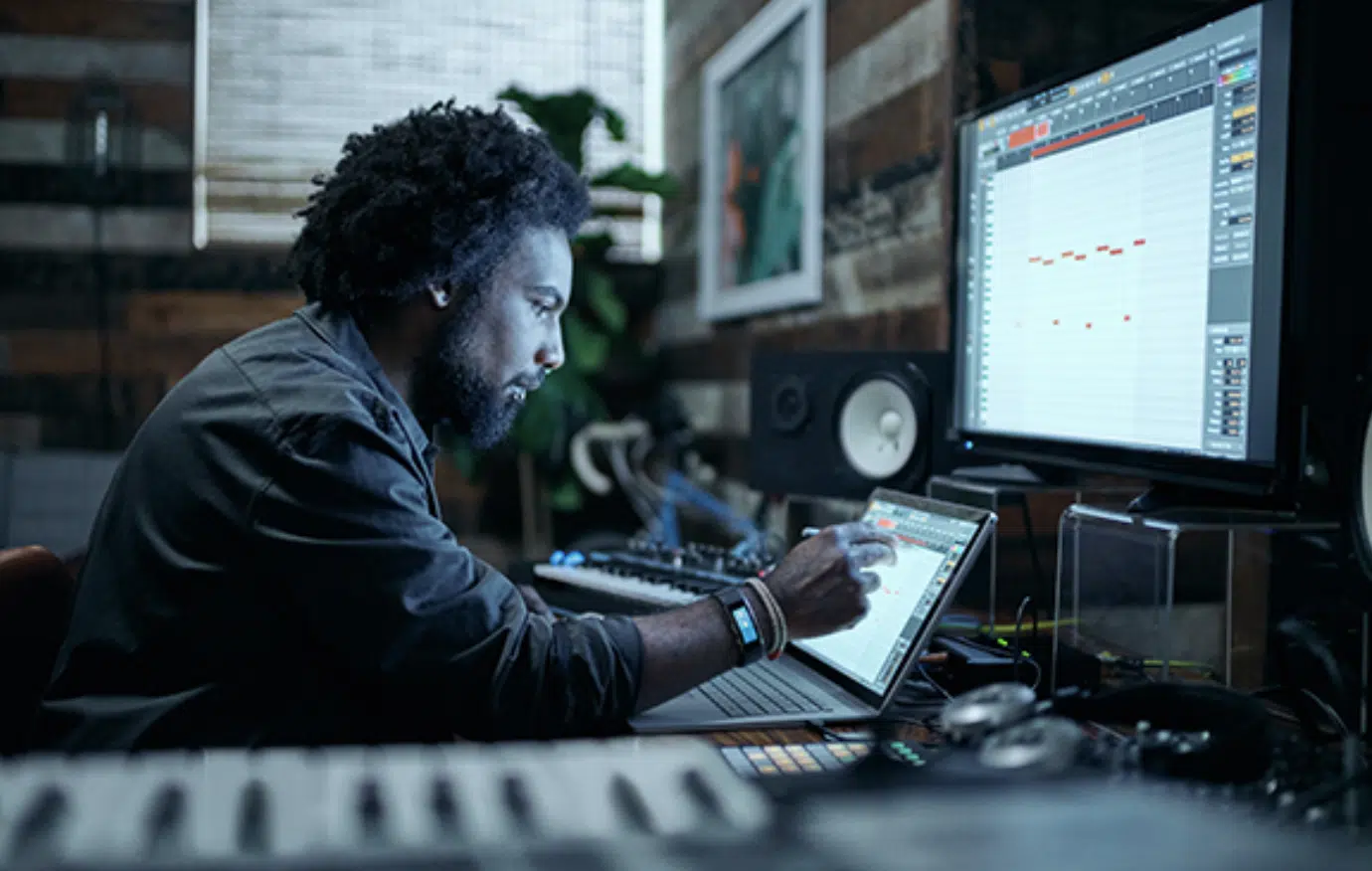
In the studio, a music editor works closely with the music producer and musicians.
Your job as a music editor would involve:
- Editing music
- Synchronizing music
- Mixing recorded music to create a professional final track
You’ll be working with digital audio workstations (DAWs) and other computer systems; using audio software to manipulate audio files.
This might involve adjusting pitch or tempo, editing out mistakes, or adding special effects to enhance the studio recording track.
Your role is vital in shaping the final sound that listeners will hear.
If you’re already familiar with these different processes, it will be an amazing music production career for you.
Looking to learn all about audio files and music stems?
We’ve got you covered!
-
The Importance of Sound Editors in Music Production
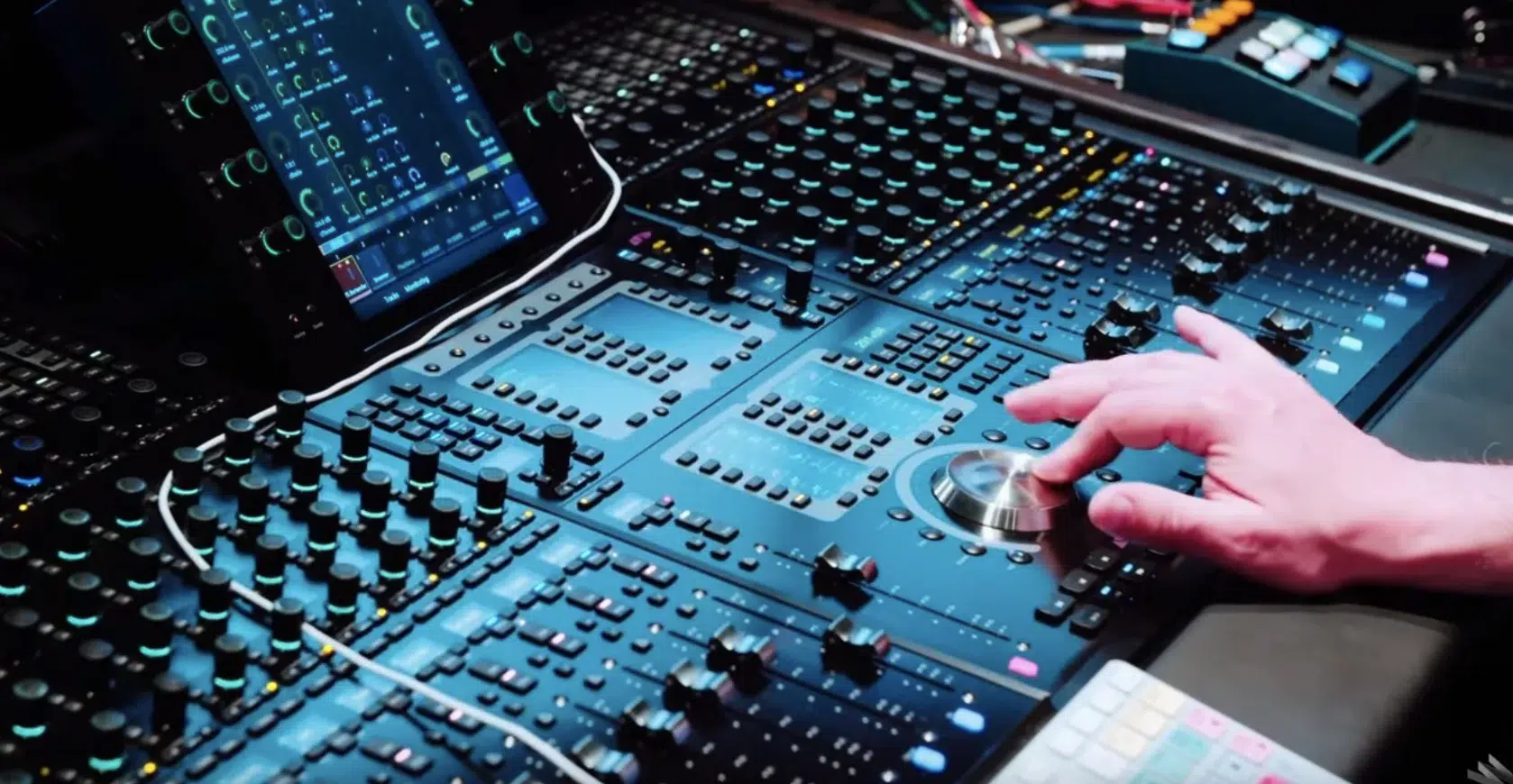
Sound editors play a crucial role in music production.
You’ll be responsible for ensuring that the final audio product is polished and ready for release.
This means not only editing music tracks but also:
- Cleaning up audio
- Removing unwanted noise
- Adding sound effects or ambient sound where needed
You might also be involved in sound design, creating unique sounds for a track or sound effects to enhance a musical performance.
Your work adds depth and richness to the music 一 creating a fuller, more engaging listening experience.
Remember, as a sound editor, your work extends beyond the recording studio.
From film and TV to video games and live performances, sound editors are needed wherever there’s audio to be refined and perfected.
-
Building Your Career as a Digital Audio Editor
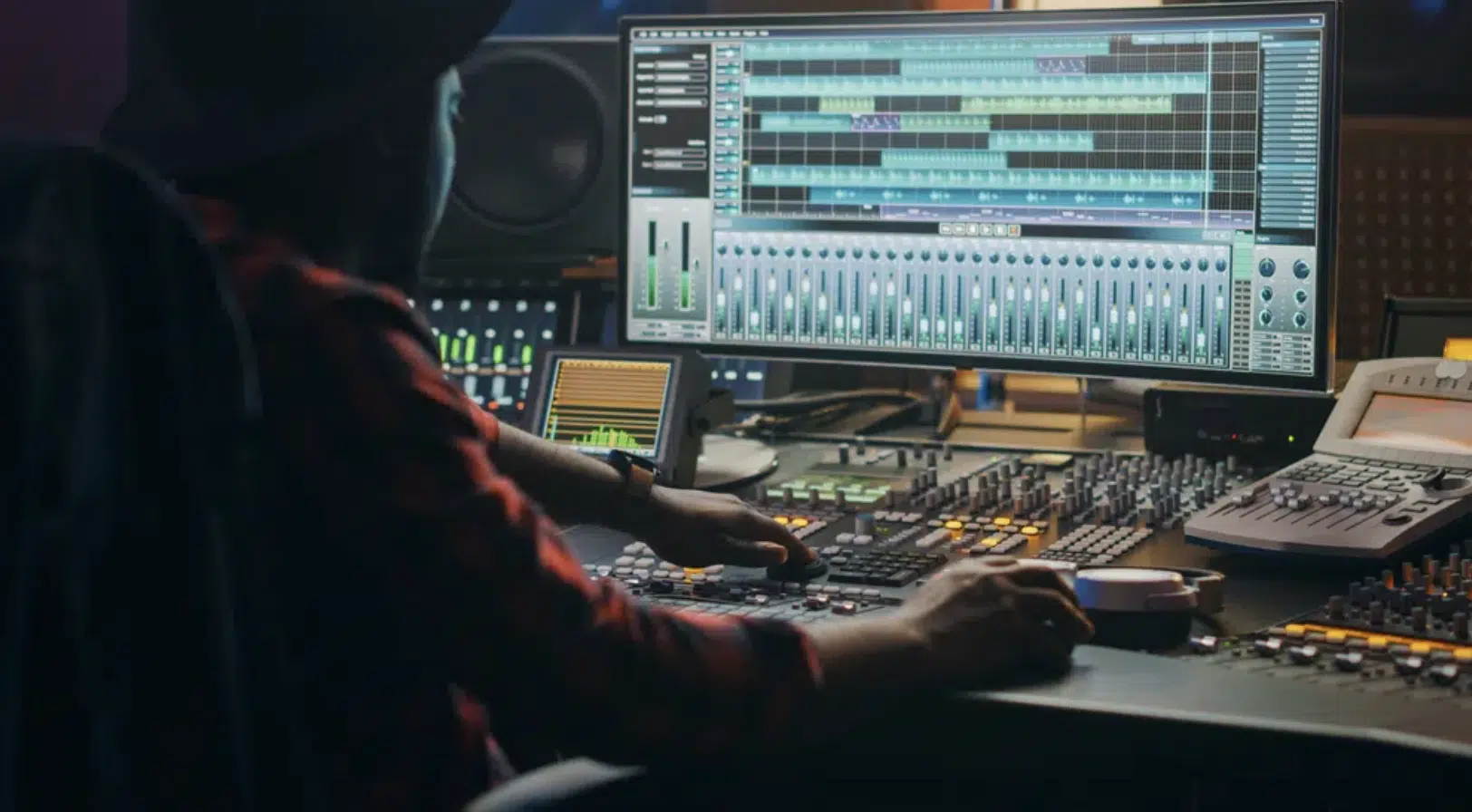
Starting a career as a digital audio editor involves mastering your skills in effects software and digital audio workstations.
Having a strong understanding of music theory can also be beneficial 一 helping you make informed decisions when editing and mixing music.
NOTE: This field is constantly evolving with advancements in music technology.
Therefore, continuous learning and staying up-to-date with the latest tools and techniques are vital for your career growth.
Remember, experience matters…
Try to gain as much hands-on experience as you can, whether it’s through internships, freelance work, production courses, or personal projects.
With time, patience, and passion, you can build a rewarding career as a digital audio editor.
-
Understanding the Job of a Live Sound Engineer

A live sound engineer is responsible for managing sound at live events, such as concerts, theatre performances, or outdoor festivals.
This involves:
- Setting up and managing audio equipment
- Mixing live sound
- Troubleshooting any sound issues that arise during the performance
In a live setting, you don’t have the luxury of post-production tweaks.
Meaning, it’s crucial to get the sound right during the event itself.
This requires a very solid understanding of acoustics and sound equipment, as well as the ability to think quickly and solve problems on the fly.
Working closely with the performing artists is another key part of your unique role.
You’ll need to understand their sound preferences and ensure their performance is heard clearly by the audience, enhancing the overall experience of the live event.
-
Building Your Path as a Live Sound Engineer
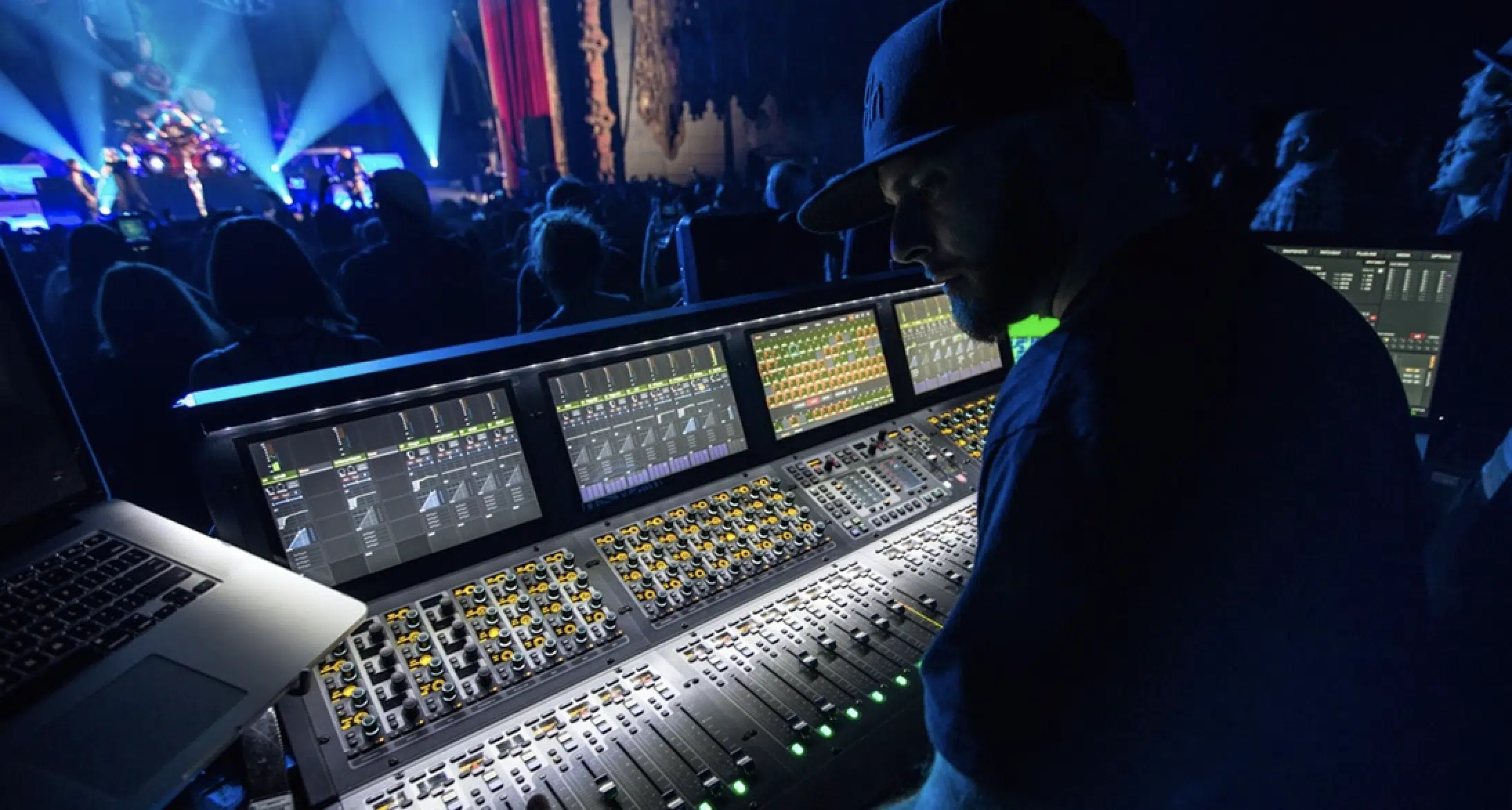
Getting started as a live sound engineer often involves hands-on experience.
While formal education can provide a solid foundation, nothing beats the learning you’ll gain from:
- Being at live events
- Learning how to set up equipment and perform sound checks
- Conducting sound checks
- Handling live mixing
Internships or entry-level positions at music venues or with touring bands can provide valuable experience.
You can also seek certification courses in sound engineering or live sound recording to enhance your technical skills.
As a live sound engineer, every event is a new challenge, and every performance is a new opportunity to learn.
It’s a job that combines technical skills with a passion for live music, making it a truly exciting career path.
Video Game & Multimedia: The Role of a Sound Designer & Audio Director
The intersection of sound and multimedia provides other fascinating music production careers for audio professionals.
In the world of video games and multimedia performances, the role of sound designers and audio directors is integral to creating immersive experiences.
-
Video Game Development
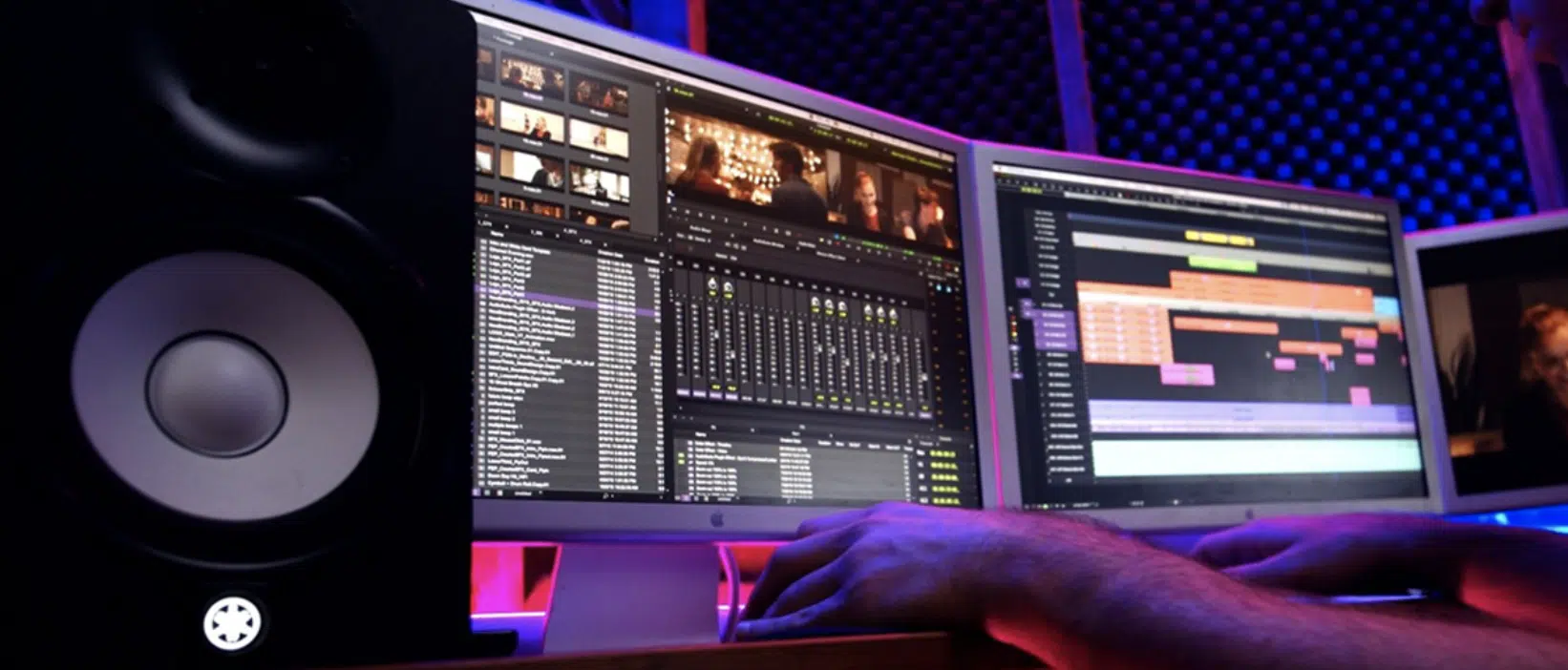
Sound design plays a crucial role in video game development.
As a sound designer (or senior sound designer), you’ll create the audio that brings the game world to life.
From the atmospheric background music to the sounds of characters’ actions and interactions, you’ll be dealing with it all.
In the realm of gaming, audio is critical in guiding players and enhancing the overall gaming experience.
You’ll work closely with game developers, artists, and designers; ensuring the audio complements the visuals and gameplay.
Whether it’s crafting the roar of a dragon, the clash of swords, traffic sounds, or the subtle rustling of leaves in a virtual forest, your sound design adds depth and realism to the game world.
Moreover, modern gaming often involves dynamic soundtracks and pristine audio that respond to players’ actions.
Understanding how to create and implement these complex sound systems can be a challenging yet rewarding aspect of a game sound designer’s job.
-
The Role of an Audio Director in Multimedia Performances
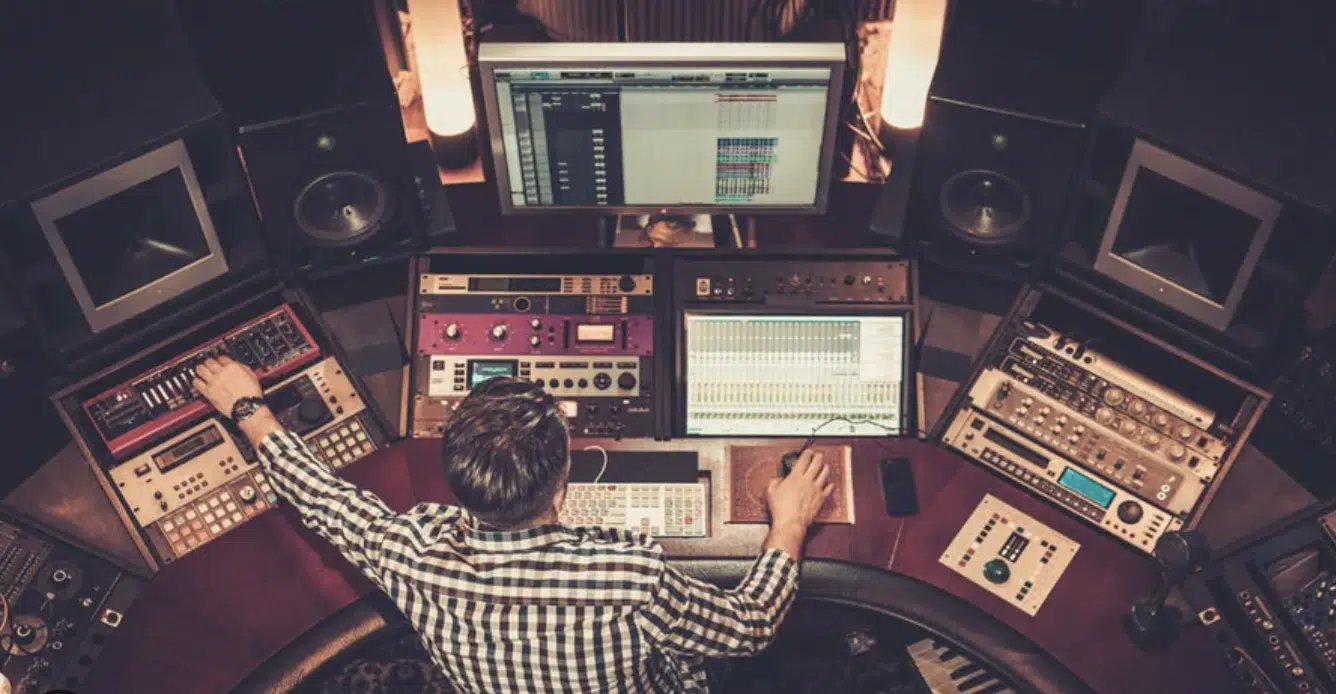
In the world of multimedia performances, such as theatre productions, live concerts, or even theme parks, an audio director plays a pivotal role.
You’re responsible for overseeing the overall sound and making sure it enhances the performance and immerses the audience in the experience.
Your duties would typically include:
- Designing and working with sound systems
- Managing the sound crew
- Coordinating with other departments such as lighting and stage design
Each performance is a masterpiece of coordination 一 with sound playing a crucial role in setting the mood and pacing the show.
Additionally, you may work with sound designers, musicians, and performers to create and fine-tune the audio content for the performance.
This could involve anything from coordinating a live orchestra to creating sound effects that bring a scene to life.
Bonus Section: 4 Additional Music Production Jobs
Now that we’ve extensively explored some key music production careers, it’s worth mentioning a few more that you might find interesting.
Each of these careers in music production plays a critical part in creating the sounds that captivate us every day.
#1. Mastering Engineer
As a mastering engineer, you’ll put the final touches on a track or album.
You will balance sonic elements and enhance the sound quality to make sure the recording translates as best as possible across all speaker systems.
If you’d like to know everything about how to become a mastering engineer, we’ve got you covered.
#2. Recording Engineers
A recording engineer manages the technical aspects of recording music.
Their duties often include setting up microphones before a recording session, running the recording equipment, and working with audio files.
As well as maintaining the recording studio’s gear.
They work closely with an artist and record producer to capture and shape the desired sound.
If any of those things sound intriguing to you, becoming a recording engineer is ideal.
#3. Mixing Engineer
The mixing engineer comes into play after all the parts of a song have been recorded in recording studios or home studios.
They adjust levels, panning, and apply effects to ensure every element is balanced and blends harmoniously.
When mixing songs, their goal is to enhance the emotional impact of the music.
If you’d like to know everything about mixing engineers, we’ve got you covered on that end too.
#4. Lead Audio Designer
A Lead audio designer usually works in the video game development industry.
They’re responsible for creating and implementing audio assets like sound effects, ambient noises, and even musical scores.
They help bring the gaming experience to life with sound.
Each of these careers in music production provides unique challenges and rewards.
They all contribute to the overall process of music production, ensuring every beat, note, and sound comes together perfectly.
Music Production Careers: Final Thoughts
Navigating through the wide array of music production careers may seem daunting.
However, with the right tools (like this article) and guidance, it’s an exciting journey to embark on.
The field offers endless possibilities to create, innovate, and transform your passion for music into a thriving career.
One fantastic resource to consider is this insanely beneficial Affiliate Program.
It offers way more than just professional insights into the world of music production…
It’s an opportunity to not only develop your skills and grow your knowledge but to earn from it as well.
The program empowers you to enhance your craft while providing an additional income stream, a win-win situation for aspiring and seasoned music producers.
Remember, there’s a whole world of music production careers waiting for you.
Take those first steps with confidence, knowing you’re equipped with the information and resources you need to succeed.
Keep learning, keep creating, and soon, you’ll find yourself living your dream in the dynamic world of music production careers.
Until next time…







Leave a Reply
You must belogged in to post a comment.